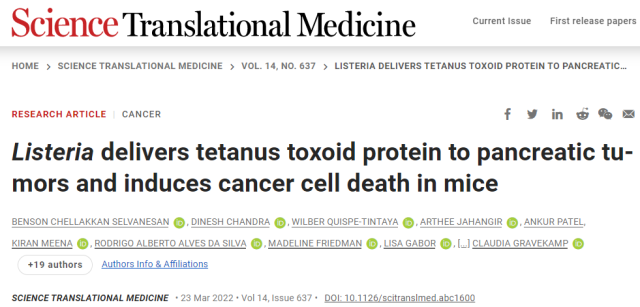New strategy uses tetanus vaccine to improve pancreatic cancer treatment!
- Statins Lower Blood Lipids: How Long is a Course?
- Warning: Smartwatch Blood Sugar Measurement Deemed Dangerous
- Mifepristone: A Safe and Effective Abortion Option Amidst Controversy
- Asbestos Detected in Buildings Damaged in Ukraine: Analyzed by Japanese Company
- New Ocrevus Subcutaneous Injection Therapy Shows Promising Results in Multiple Sclerosis Treatmen
- Dutch Man Infected with COVID-19 for 613 Days Dies: Accumulating Over 50 Virus Mutations
New strategy uses tetanus vaccine to improve pancreatic cancer treatment!
- Red Yeast Rice Scare Grips Japan: Over 114 Hospitalized and 5 Deaths
- Long COVID Brain Fog: Blood-Brain Barrier Damage and Persistent Inflammation
- FDA has mandated a top-level black box warning for all marketed CAR-T therapies
- Can people with high blood pressure eat peanuts?
- What is the difference between dopamine and dobutamine?
- How long can the patient live after heart stent surgery?
New strategy uses tetanus vaccine to improve pancreatic cancer treatment! Reduce cancer metastasis by 87%!
Immunotherapy has so far been poorly used in the treatment of highly aggressive pancreatic ductal adenocarcinoma.
Pancreatic ductal adenocarcinoma is a highly metastatic disease and the tumor is poorly immunogenic and immunosuppressive, preventing T cell activation in the tumor microenvironment.
In recent studies, a new strategy successfully made pancreatic tumors visible in the immune system of mice and made them vulnerable to immune attack, reducing cancer metastasis by 87 percent.
Pancreatic cancer is notoriously difficult to cure or even treat. Now, a new strategy devised by scientists at the Albert Einstein College of Medicine has successfully made pancreatic tumors visible and vulnerable to immune attack in the immune systems of mice, reducing cancer metastasis by 87 percent.
The paper describing the finding, “ Listeria delivers tetanus toxoid protein to pancreatic tumors and induces cancer cell death in mice ,” appears online in the journal Science Translational Medicine .

“Today’s checkpoint inhibitor drugs are effective against certain types of cancer,” said Claudia Gravekamp , Ph. Very good, but very little help for pancreatic cancer patients.
The problem is that pancreatic tumors are not ‘foreign’ enough to attract the attention of the immune system, usually suppressing any immune response that occurs.
Essentially, our new therapy makes immune ‘ Cold’ tumors are hot enough for the immune system to attack and destroy them. “
Take advantage of the tetanus vaccine
Dr. Gravekamp’s treatment strategy takes advantage of the fact that nearly all people are vaccinated in childhood for tetanus, a serious disease caused by a virulent protein secreted by the Clostridium bacterium.
Because their tetanus-specific memory T cells circulate in the bloodstream for life, vaccinated people will mount a strong immune response if they are later exposed to the highly foreign tetanus toxin.
Dr. Gravekamp and her colleagues effectively evoked a potent and specific immune response against pancreatic cancer cells by infecting them with bacteria that deliver tetanus toxin into the cells.
Using the same tetanus vaccine given to people, the researchers inoculated mouse models of pancreatic cancer—mice with human pancreatic tumors.
They then fused the gene encoding the tetanus toxin into non-pathogenic Listeria monocytogenes, which are highly adept at infecting cells and spreading through tissues.
Finally, to infect and “tetanise” the tumors, they injected the bacteria with their tetanus gene into previously vaccinated, tumor-bearing mice.
Using cancer immunosuppression
Dr Gravekamp said: “Listeria is quite weak and can be easily killed by the immune systems of humans and animals – anywhere, except in the tumor area. Our treatment strategy is actually taking advantage of the fact that pancreatic tumors are so good at suppressing the immune system to protect themselves. This fact. This means that only those Listeria bacteria in the tumor area survive long enough to infect pancreatic tumor cells, healthy cells are not infected. ”
Once Listeria infects tumor cells, their tetanus toxin gene expresses a tetanus toxin protein inside the tumor cells — triggering a strong immune response.
Tetanus toxin activates pre-existing tetanus-specific memory T cells, allowing CD4 T cells to attack and kill infected tumor cells.
Adding low-dose gemcitabine, a chemotherapy drug that reduces immunosuppression, boosts T-cell responses.
The treatment reduced the size of pancreatic tumors in the mice by an average of 80 percent and the number of metastases by a significant 87 percent, while the treated animals lived 40 percent longer than untreated (control) animals.
“The findings suggest that this treatment could be a useful immunotherapy for pancreatic cancer, as well as other difficult-to-treat cancers, such as ovarian cancer,” said Dr. Gravekamp.
Reference:
https://medicalxpress.com/news/2022-03-therapeutic-strategy-pancreatic-cancer.html
New strategy uses tetanus vaccine to improve pancreatic cancer treatment! Reduce cancer metastasis by 87%!
(source:internet, reference only)
Disclaimer of medicaltrend.org
Important Note: The information provided is for informational purposes only and should not be considered as medical advice.



